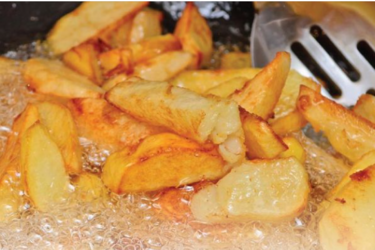What is the best oil for frying

Fried foods play an important role in many traditional cuisines and are a bestseller in the fast food industry. It's well known that regular consumption can have a negative impact on health. However, this partly depends on what kind of oil you prefer to use for frying.
The stability of the chemical composition of the cooking oil at high temperatures is one of the key factors. Healthy cooking oils have a high smoke point and are stable, so they do not react with oxygen when heated. Oils that contain higher levels of saturated fat are generally more stable when heated. Mostly saturated and monounsaturated oils are suitable for frying.
Cooking oils that contain a large amount of polyunsaturated fat are less suitable for frying. This is because polyunsaturated fats contain two or more double bonds in their chemical structure. These double bonds can react with oxygen and form dangerous, potentially harmful compounds when exposed to high temperatures.
ANIMAL FATS
Animal fats such as lard and ghee are good choices for frying. They add flavor and crispness to the food.
Most of the fatty acids in animal fats are saturated and monounsaturated. This makes them resistant to high temperatures. However, the fatty acid content can vary depending on the animal's diet. Those that eat grain have more polyunsaturated fatty acids in their fat reserves than those that eat grass.
Butter, on the other hand, contains a small amount of carbohydrates and protein, which are burned when heated. Ghee is a better option for frying.
COCONUT OIL
More than 90% of the fatty acids in coconut oil are saturated, which makes it resistant to heat. Studies have shown that even after 8 hours of continuous deep-frying at 180°C, the quality of this oil remains acceptable.
Experts have not reached a consensus on the advantages and disadvantages of eating saturated fats. Many healthcare expert organizations recommend limiting saturated fat consumption to 10%, and some of them to 5-6% of total calories.
However, the results of recent studies suggest that saturated fats do not increase the risk of heart disease. Moreover, one of the largest studies, PURE, demonstrated a higher risk of cardiovascular mortality with a low level of saturated fat consumption.
When choosing coconut oil, keep in mind that some varieties may have a taste or smell that are not to everyone's liking.
It's best to try several brands to find the one that's right for you.
OLIVE OIL
Olive oil is one of the healthiest oils. It is resistant to heat because, like animal fats, it contains a lot of monounsaturated fatty acids. These fatty acids have only one double bond, which makes them relatively stable.
One study used olive oil in an air fryer for more than 24 hours before it became excessively oxidized. In theory, this makes it a good choice for frying. However, the flavor and aroma of olive oil can deteriorate with prolonged heating.
AVOCADO OIL
Avocado oil has a similar composition to olive oil. It is mainly monounsaturated fats with saturated and polyunsaturated fats. Refined avocado oil has a high smoke point (270°C) and a slightly nutty flavor.
PEANUT BUTTER
It has a high smoke point (230°C) and a neutral flavor. However, it contains about 32% polyunsaturated fat. This is a relatively high amount, which makes this oil vulnerable to oxidation at high temperatures.
PALM OIL
Consists mainly of saturated and monounsaturated fats, which makes it a good option for frying. The flavor can be neutral, especially when used unrefined. However, some people are concerned about the environmental issue as forests are cut down to produce palm oil.
WHAT OILS ARE NOT SUITABLE FOR FRYING
These are vegetable oils with a high content of polyunsaturated fatty acids, such as soybean, corn, rapeseed, cottonseed, safflower, sunflower, sesame, as well as rice bran and grape seed.
The use of these oils for frying results in the formation of large amounts of oxidized fatty acids and potentially harmful compounds.
FRYING ADDS CALORIES
Even if you use healthy oils, frying adds a lot of calories to your meals, so it's best not to eat them too often. The additional calories usually come from other ingredients, such as batter and flour, as well as from the oil itself.
Excessive consumption of fried foods is associated with weight gain, especially in people with a family history of obesity. To minimize unnecessary calories, be sure to cook food at the right temperature and for no longer than necessary.
As a result, fried foods should not be included in your menu regularly. If you do plan to fry something, it is better to use lard, melted butter, coconut oil, or olive oil for this purpose.

